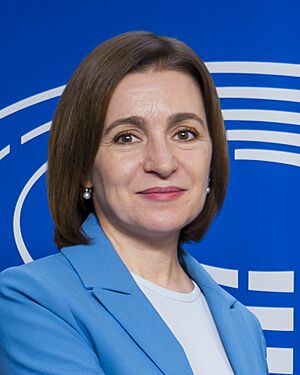President of Moldova facts for kids
Quick facts for kids President of the Republic of Moldova |
|
|---|---|
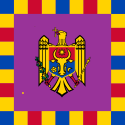
Presidential standard
|
|
| Executive branch of the Government of Moldova Office of the President of Moldova |
|
| Style | Madam President (informal) Her Excellency (diplomatic) |
| Member of | Supreme Security Council |
| Residence | Presidential Palace |
| Seat | Chișinău |
| Appointer | Popular vote |
| Term length | Four years,
renewable once consecutively
|
| Constituting instrument | Constitution of Moldova (1994) |
| Inaugural holder | Mircea Snegur |
| Formation | 3 September 1990 |
| Deputy | President of the Parliament |
| Salary | MDL 155,520 annually |
The President of the Republic of Moldova (Romanian: Președintele Republicii Moldova) is the top leader and head of state of Moldova. This person represents the country and makes sure its laws and rules are followed. The current president is Maia Sandu, who started her job on December 24, 2020.
Contents
What Does the President Do?
The president is like the main representative of Moldova. They make sure the country stays independent and united. The president also helps different parts of the government work well together and protects the rule of law. When a president starts their job, they promise to work for Moldova's success and follow its laws.
Moldova is a parliamentary republic. This means that many of the president's powers are used with the approval of the Parliament or based on advice from the Government. So, the president's role is mostly ceremonial, like a symbol for the country. However, because the president represents Moldova to other countries, they have a big say in foreign policy. They can also influence what happens inside the country by talking about important issues. The president also has special powers to protect Moldova's constitution.
Working with the Government
To keep the government running smoothly, the president calls for a new Parliament meeting within 30 days after an election. They also suggest a person to be the prime minister after talking with leaders of different political parties. If Parliament agrees with the suggested prime minister and their team of ministers, the president officially appoints them. If the prime minister cannot do their job, the president chooses another minister to take over temporarily.
The president also officially approves laws passed by Parliament. They handle things related to foreign relations and national defence. For example, the president sends Moldovan ambassadors to other countries and welcomes foreign diplomats to Moldova. As the leader of the Armed Forces, the president can order the army to get ready, fight against attacks, or declare a state of war to keep people safe. All these actions are usually done with the government's advice and need the prime minister's approval.
Special Powers of the President
The president has several special powers they can use:
- They can call special meetings of Parliament.
- They can suggest new laws to Parliament.
- They can attend Parliament meetings and speak about important national topics.
- They can end Parliament's session and call for new elections.
- They can make agreements with other countries for Moldova.
- They can give out medals, awards, and special ranks.
- They can decide who becomes a Moldovan citizen and grant political asylum.
- They can appoint certain public officials.
- They can grant pardons to individuals.
- They can ask Moldovan citizens to vote in a referendum on important national issues.
- They can give higher qualifications to certain public servants, like judges.
- They can temporarily stop government rules that go against laws passed by Parliament.
- If the president disagrees with a law, they can send it back to Parliament to be looked at again. If Parliament still approves it, the president must sign it.
- They appoint judges based on suggestions from the Superior Council of Magistracy.
- They set up and lead the Presidential Administration, which is a team that helps the president with their work.
How the President is Chosen
The president is chosen by a direct election where people vote. If no candidate gets more than half the votes in the first round, the top two candidates have a second vote (a runoff). This system started when Moldova's constitution was created in 1994.
For a while, from 2000, the president was chosen by Parliament. But in 2016, the Constitutional Court decided that this change was not allowed. So, Moldova went back to having people vote directly for their president.
A president's term lasts for four years. A person can be president for two terms in a row. Before the year 2000, a presidential term was five years long.
To become a candidate for president, a person must be a Moldovan citizen, be at least 40 years old, have lived in Moldova for at least 10 years, and speak the official state language.
The President's Place in the Constitution
According to Article 77 of the Constitution of Moldova (1994), the president is the head of the state. They represent the country and make sure Moldova's independence, unity, and territory are protected.
Acting President
An acting president of Moldova (Romanian: Președinte interimar al Republicii Moldova) is someone who takes over the president's duties if the president cannot do their job or if the position is empty. This is a temporary role described in Moldova's Constitution.
Article 91 of the Constitution says that if the president's job is empty, or if the president is temporarily unable to work, the President of Parliament takes over first. If they can't, then the Prime Minister takes over.
Suspension from Office
Article 89 of the Constitution explains how a president can be suspended from office:
- If the president does something very serious that goes against the constitution, Parliament can vote to suspend them. Two-thirds of the members must agree.
- At least one-third of Parliament members must suggest the suspension. The president is told right away and can explain their actions to Parliament.
- If Parliament approves the suspension, a national vote (a referendum) is held within 30 days to decide if the president should be removed from office.
When the Office is Empty
Article 90 of the Constitution states when the president's office can become empty:
- When the president's term ends.
- If the president resigns.
- If the president is removed from office.
- If the president is permanently unable to do their job.
- If the president dies.
- If the president's office becomes empty, Parliament makes an official decision about it.
- New elections for a president must be held within three months after the office becomes empty.
Presidential Standard
The presidential standard (Romanian: Stindardul Preşedintelui) is a special flag. It has the Coat of Arms of Moldova on a purple background, with a border made of squares in Moldova's national colors. The president's decree approves the rules for this standard. The original standard is given to the president when they start their job and is kept in their office. Copies of the standard are displayed at the Presidential Palace or other presidential homes when the president is there.
Presidential Music
The official song for the president is called Marș de Întîmpinare «La Mulți ani» (Slow March «To many years»). It is played when the president arrives at special events, similar to "Hail to the Chief" in the United States. The Presidential Band of the Republic of Moldova is the main military band that serves the president. They perform at ceremonies for foreign leaders, military parades, and when new ambassadors are welcomed.
Office of the President Staff
The president has a team of people who help them with their daily work and advise them on different topics. Some key members of this team include:
- Lilia Tonu – Deputy Secretary General
- Adrian Băluțel – Chief of Staff
- Olga Roșca – Advisor on Foreign Policy and European Affairs
- Stanislav Secrieru – Defense and National Security Advisor; Secretary of the Supreme Security Council
- Stella Jantuan – Advisor on Political Issues, Relations with Public Authorities and Civil Society
- Valentina Chicu – Education and Research Advisor
- Larisa Miculeț – Advisor on Relations with Citizens
- Elena Druță – Advisor on Diaspora Relations
- Igor Zaharov – Press Secretary and Public Communication Advisor
Past Presidents of Moldova
Here is a list of the presidents of the Republic of Moldova since it became independent.
Republic of Moldova (1991–present)
- Parties
PDAM PCRM PL PLDM PDM PSRM PAS Independent
- Status
Acting President
| No. | Portrait | Name (Birth–Death) |
Office term | Cabinets | Election | Prior office | Political party | |
|---|---|---|---|---|---|---|---|---|
| 1 | 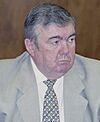 |
Mircea Snegur (1940–2023) |
3 September 1990 | 15 January 1997 | Druc (1990–91) | 1991 | Chairman of the Supreme Soviet of SSR Moldova | Independent |
| 6 years, 134 days (Lost re-election campaign) |
Muravschi (1991–92) | |||||||
| Sangheli I (1992–94) | ||||||||
| Sangheli II (1994–97) | ||||||||
| 2 |  |
Petru Lucinschi (born 1940) |
15 January 1997 | 7 April 2001 | Ciubuc I (1997–98) | 1996 | President of the Parliament | Democratic Agrarian Party |
| 4 years, 82 days (Opted out of second term in office) |
Ciubuc II (1998–99) | |||||||
| Sturza (1999) | ||||||||
| Braghiș (1999–2001) | ||||||||
| 3 | 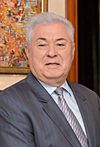 |
Vladimir Voronin (born 1941) |
7 April 2001 | 11 September 2009 | Tarlev I (2001–05) | 2001 (indirect) 2005 (indirect) |
Minister of Internal Affairs of the Moldavian SSR | Party of Communists |
| 8 years, 157 days (Resigned) |
Tarlev II (2005–08) | |||||||
| Greceanîi I (2008–09) | ||||||||
| Greceanîi II (2009) | ||||||||
| – | 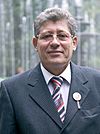 |
Mihai Ghimpu (born 1951) Acting |
11 September 2009 | 28 December 2010 | Filat I (2009–11) | — | President of the Parliament | Liberal Party (Alliance for European Integration) |
| – | 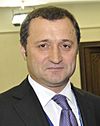 |
Vlad Filat (born 1969) Acting |
28 December 2010 | 30 December 2010 | — | Prime Minister of Moldova | Liberal Democratic Party (Alliance for European Integration) |
|
| – | 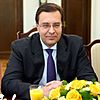 |
Marian Lupu (born 1966) Acting |
30 December 2010 | 23 March 2012 | Filat II (2011–13) | — | President of the Parliament | Democratic Party (Alliance for European Integration) |
| 4 | 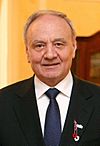 |
Nicolae Timofti (born 1948) |
23 March 2012 | 23 December 2016 | Filat II (2011–13) | 2011–12 (indirect) |
President of the Superior Council of Magistrates | Independent (Alliance for European Integration) |
| Leancă (2013–15) | ||||||||
| 4 years, 275 days (Opted out of second term in office) |
Gaburici (2015) | |||||||
| Streleț (2015) | ||||||||
| Filip (2016–19) | ||||||||
| 5 | 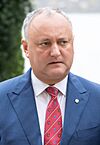 |
Igor Dodon (born 1975) |
23 December 2016 | 24 December 2020 | 2016 | First Deputy Prime Minister;
Minister of Economy and Trade |
Party of Socialists | |
| 4 years, 1 day (Lost re-election campaign) |
Sandu (2019) | |||||||
| Chicu (2019–20) | ||||||||
| 6 | 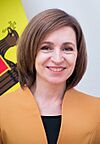 |
Maia Sandu (born 1972) |
24 December 2020 | Incumbent | 2020 2024 |
Prime Minister of Moldova | Party of Action and Solidarity | |
| 5 years, 62 days | Gavrilița (2021–2023) | |||||||
| Recean (2023–) | ||||||||
Presidential Residence
The Presidential Palace is located in the Buiucani area of Chișinău. It was built between 1984 and 1987. This special building was originally where the Supreme Soviet of the Moldavian SSR used to meet.
Images for kids
-
Official residence on Stephen the Great Boulevard.
See also
 In Spanish: Presidente de Moldavia para niños
In Spanish: Presidente de Moldavia para niños
 | James Van Der Zee |
 | Alma Thomas |
 | Ellis Wilson |
 | Margaret Taylor-Burroughs |


